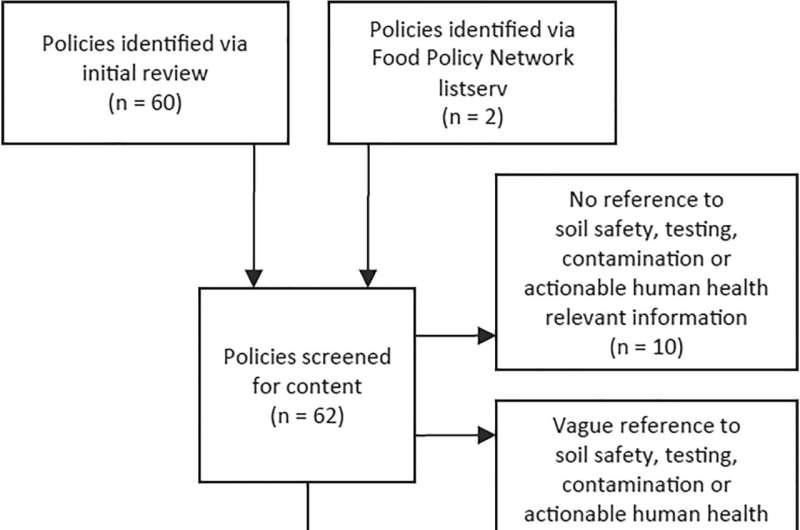Lead safety guidance lacking for urban farmers in many major US cities

Urban gardens and farms are on the rise in the U.S., but urban soils are sometimes contaminated from legacy pollution and industrial use. Despite this risk, there is little guidance for people growing food in urban soils on what levels of lead are safe, and existing policies vary widely between cities and states, as a new study highlights.
Lead, and other potentially toxic elements, are of concern in soils that are used to grow food because plants can incorporate those harmful elements into their roots, stems, leaves and fruits, which are then eaten. Exposure to even low levels of lead, primarily through ingestion, can cause health problems such as heart disease and neurological dysfunction, and lead is especially harmful to children, who are still developing.
Currently, the most commonly cited safety level for lead in soil is 400 milligrams of lead per kilogram of soil. But that value, established in 1994 by the Environmental Protection Agency, represents the threshold at which an investigation for residential soil cleanup would occur, not a threshold for safe food production. There are no federal regulations defining safe soil contamination levels for growing food.
The new study, published in GeoHealth, reviewed soil safety policies from the 40 most populous cities in the U.S., plus two additional cities (Minneapolis and Pittsburgh) that the researchers knew had soil safety policies.
Of the 42 cities reviewed, 23 had at least one policy around testing soil, and only 10 had lead-specific policies. Among those 10 policies, the "acceptable" amount of lead in soils varied from 34 to 400 milligrams of lead per kilogram of soil. Eighteen of the top 40 cities lacked any guidance on urban agriculture. The results, the researchers concluded, pointed to a need for more consistent guidance from the federal level as well as better access to information at lower municipal levels.
"At the federal level, we need more research to learn about how the people who grow our food come into contact with potentially contaminated soils and to better define guidelines for levels of contaminants," said Sara Lupolt, a public health scientist at Johns Hopkins University who led the new study.
"There are some very straightforward, low- or no-cost things you can do differently to really reduce your exposure and feel confident that you're gardening safely," said Keeve Nachman, a public health scientist at Johns Hopkins University who co-authored the new study. These range from choosing growing sites carefully to avoid contamination or using raised beds to simply running municipal water for a few minutes before watering to help clean out pipes.
Safe soils
Urban agriculture can be an important path to food security for historically disadvantaged communities, but those communities are often in areas that are more polluted, including soil pollution. These communities are less likely to have the resources to remediate polluted soils and water.
"There are so many benefits from urban agriculture, and it should not be an added route of exposure for communities that already face higher exposure [to contamination] than other communities," said Lupolt. "Urban growers and the communities they serve need to be confident they can practice urban agriculture safely and sustainably."
Establishing federal standards for safe lead levels in urban agricultural soils is critical for helping cities and municipalities develop their own soil safety policies and support/resources. But equally important is ensuring that those guidelines are easily accessible not only to policymakers, but also to members of the public who might be leading local agricultural initiatives. The new study stemmed from the researchers' difficulties in finding cities' policies during their previous community-science study on urban agriculture.
"This paper was a reaction to our frustration as public health practitioners trying to communicate about a complex issue," said Lupolt. "Cities need to invest in communicating the policies and programs they have that support the safer conduct of urban agriculture to urban growers, who are trying to do a great thing by growing food in their city."
Research and policy change are slow, but growers can also use best behavioral practices to help minimize their exposure to potential contaminants. The Environmental Protection Agency has existing interim guidelines related to urban agriculture and contaminated sites that can inform local governments and practitioners, as well as guidelines for people gardening in potentially lead-contaminated soils.
"There is tremendous value in transparently synthesizing a body of evidence to help identify and communicate the state of information on an issue as [this study] has done," said Jessica Frank, a biologist at the Environmental Protection Agency. "This synthesis demonstrates a lack of consistency in guidance or recommendations provided to urban agricultural practitioners and a need to advance work in this area to create meaningful, consistent and effective recommendations and communication materials that are readily available to practitioners."
But ultimately, said Lupolt and Nachman, cities need to help reduce costs for soil testing and provide clear safety guidelines to ensure urban growers can grow food for their communities safely and confidently.
More information: Sara N. Lupolt et al, Urban Soil Safety Policies: The Next Frontier for Mitigating Lead Exposures and Promoting Sustainable Food Production, GeoHealth (2022). DOI: 10.1029/2022GH000615
Provided by American Geophysical Union





















